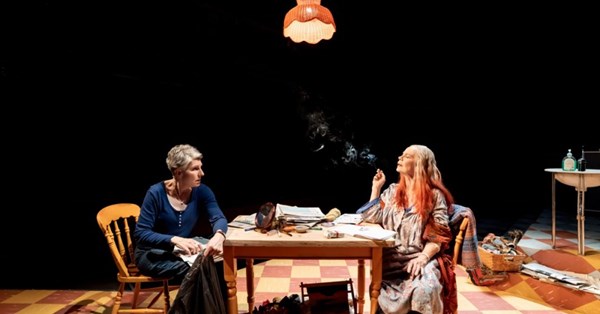I FELT sorry for the woman who left at the interval. “I’m not enjoying this. It’s going round in circles. It’s repetitious, and the repetitions are not taking us anywhere,” she said. If only she’d stayed, she would have been given the key to unlock the beginning.
The day before Mothering Sunday, it seemed apt to go to see a play about a mother-daughter relationship, especially one with two actresses as fine as Celia Imrie and Tamsin Greig. The play was Backstroke, and it was about how we are moving forward even when we feel like we’re going backwards.
It was around the fifth anniversary of the Covid lockdowns. On the walls of the theatre bar, there were posted messages written by members of the audience after previous shows: not messages about the show, but about their own mothers. “Who took me to the theatre and sang in the kitchen.” “Who danced naked in the rain.” “Who slowly retreated from the person she once was.” “Who gave too much love ever to be forgotten.”
Backstroke is about a mother who is a reckless, feckless, hedonistic, capricious, selfish, self-deluded, bohemian hippie. She says things that a mother shouldn’t say to a daughter, but she is filled with immense zest for life, even when her words and memories begin to fade from her grasp as she slips slowly into dementia. Her daughter is sensible, dutiful, and pragmatic, but overburdened by both a dependent mother and an adopted daughter at a special school, who is plagued with some kind of post-traumatic stress.
This is not exactly a fun night out in the theatre, you might think. But Imrie is outrageously rude and funny; and Greig is immensely moving.
As the woman who left at half-time would probably tell you, the first half is too long. The rounds of bickering lack a narrative thrust. But the second act provides both shape and purpose, as we begin to see the love and fun that balance the downsides of the relationship, and the story starts to take us to a poignant denouement.
It is a story that stays with you after leaving the theatre, and, indeed, resonated the next morning with the heartbreaking testimonies on Radio 4’s Sunday Worship of mothers unvisited during lockdown, who died alone, each loss leaving an indelible mark on a daughter’s heart. Preaching at the service, the Revd Richard Reddie said: “We were told we were all in the same boat, but we were not. We were all in the same storm, but we were in different boats. Some were akin to luxury yachts, while others were barely seaworthy.”
We are fragmentary beings, the novelist Howard Jacobson said, in one of his characteristically brilliant A Point of View radio essays, after the service. We have to learn “to rejoice in the idea that life is passionate [and] piecemeal”.
The writer of Backstroke, Anna Mackmin, is offering us a defiant celebration of life in the face of death. And the play’s audience is teaching us to see the beauty in the everyday. “Who cuddled me and made me feel safe.” “Who was happiest at the beach.” “Who did the best with what she had.” “Who told me everything would be alright.”

















